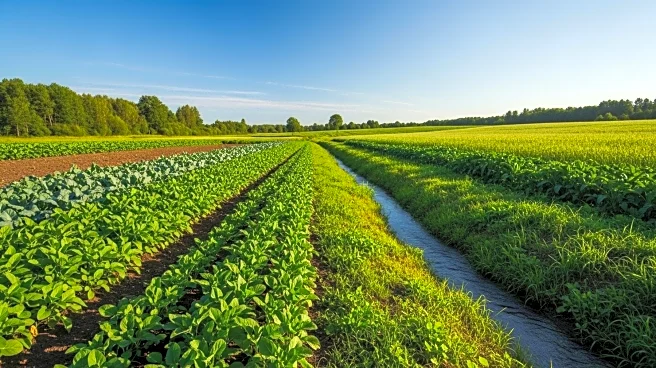What's Happening?
The United States regenerative agriculture market is experiencing rapid growth, driven by increased environmental awareness and demand for sustainable food production. Regenerative agriculture encompasses practices aimed at restoring soil health, enhancing biodiversity, and promoting sustainable farming. This includes products, technologies, and services that support carbon sequestration, reduced chemical usage, and ecosystem resilience. Recent developments in the U.S. include federal incentives for bioethanol producers tied to lower carbon intensity in corn farming, and Bayer's release of carbon credits sourced from certified regenerative agriculture initiatives. These initiatives are expanding carbon markets and encouraging farm adoption of regenerative practices.
Why It's Important?
The expansion of the regenerative agriculture market in the U.S. is significant for several reasons. It represents a shift towards more sustainable farming practices that can help mitigate climate change by improving soil health and increasing carbon sequestration. This market growth also reflects a broader trend of consumers demanding environmentally friendly food production methods. Key players like General Mills Inc., Cargill, Inc., and Danone S.A. are investing in these practices, which could lead to increased market competitiveness and innovation. The focus on sustainable agriculture could also influence public policy and encourage further investment in environmental initiatives.
What's Next?
Future developments in the regenerative agriculture market may include increased federal support and incentives for sustainable farming practices. As the market continues to grow, more companies may adopt regenerative methods, leading to further innovation and expansion. Additionally, advancements in technology, such as AI-driven data management, could optimize crop yields and resource efficiency, further enhancing the market's growth potential. Stakeholders, including policymakers and industry leaders, are likely to continue advocating for sustainable practices, potentially influencing regulations and market dynamics.
Beyond the Headlines
The growth of regenerative agriculture in the U.S. could have long-term implications for food security and environmental sustainability. By improving soil health and biodiversity, these practices can enhance ecosystem resilience and reduce dependency on chemical inputs. This shift may also lead to cultural changes in farming communities, as traditional methods are replaced by more sustainable practices. Furthermore, the increased focus on regenerative agriculture could drive ethical considerations regarding food production and environmental stewardship.









